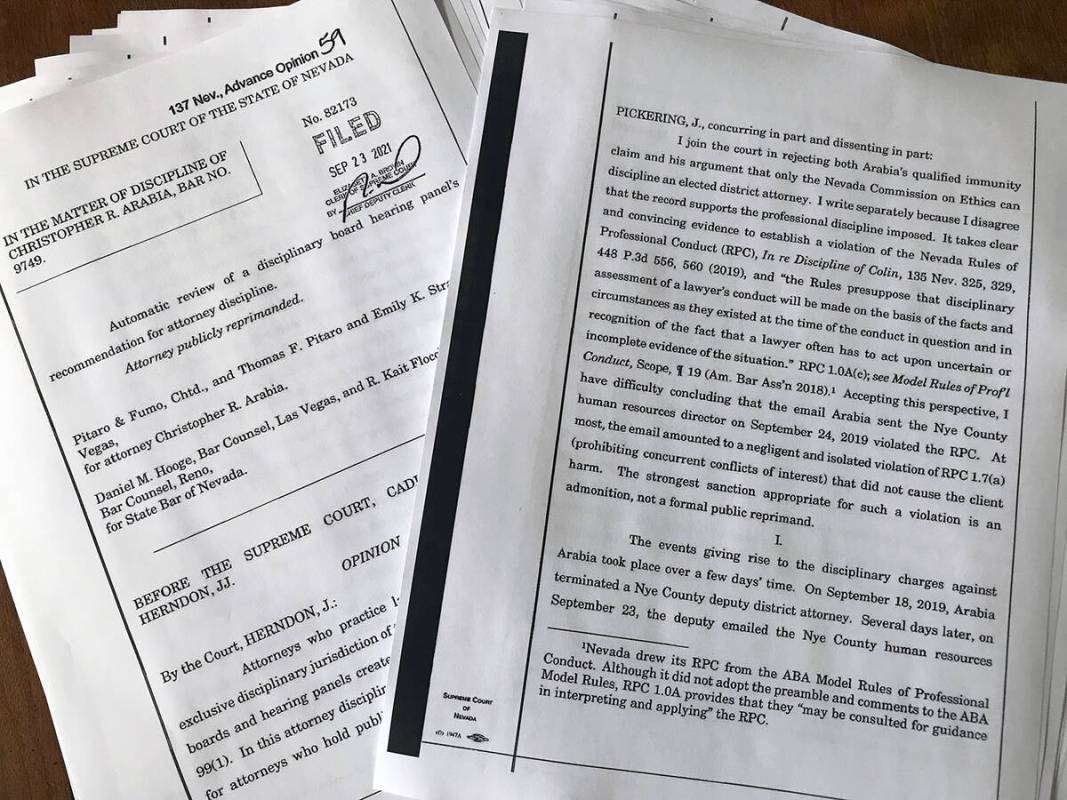
A panel of the Nevada Supreme Court, in a split decision, has issued a public reprimand of Nye County District Attorney Chris Arabia over the handling of an appeal request from a former Nye County deputy district attorney, whom Arabia fired in September of 2019. This is apparently not the end of the matter, however, as Arabia stated he will be pursuing the case further with the aim of having the entire Nevada Supreme Court, rather than just a panel, review the matter.
The case, No. 82173, went before a three-member panel of the Nevada Supreme Court that included judges Douglas Herndon, Elissa Cadish and Kristina Pickering.
Case overview
“On Sept. 15, 2019, Arabia terminated Michael Vieta-Kabell’s employment as an assistant district attorney. Vieta-Kabell maintained that he was terminated because he had been attempting to unionize assistant district attorneys, but Arabia asserts the termination was the result of Vieta-Kabell’s job performance,” the Nevada Supreme Court Advance Opinion, issued on Thursday of last week, explains. “Vieta-Kabell filed an appeal of his termination with Nye County on Sept. 23, 2019.”
It was this filing of an appeal that eventually resulted in the case going before the Nevada Supreme Court.
According to the documents, Nye County Human Resources Director Danelle Shamrell had scheduled the requested appeal hearing only to receive an email from Arabia that stated it was his legal opinion that the hearing should be canceled, as Vieta-Kabell was an “at-will” employee. As such, Arabia stated that an appeal hearing was not available to Vieta-Kabell. Following the legal advice of the county’s top attorney, Shamrell then canceled the hearing.
Vieta-Kabell responded by filing a grievance with the Nevada State Bar. Arabia twice attempted to have that complaint dismissed, claiming that he was protected under qualified immunity and further asserting that the state bar lacked jurisdiction over him as an elected official. Both of those motions were denied.
“Arabia contends that he cannot be professionally disciplined because his actions are entitled to protection under the qualified immunity doctrine, and thus, this matter must be dismissed. We disagree,” the advance option reads. It goes on to state that qualified immunity generally applies when a plaintiff is seeking damages or redress for the actions of a government employee, noting, “An attorney discipline proceeding is not such an action.”
As to Arabia’s assertion that the state bar lacks jurisdiction because the Nevada Commission on Ethics is charged with disciplining elected officials, the advance opinion states, “We disagree because the commission’s (on ethics) jurisdiction over public officers is not exclusive.”
The Nevada Supreme Court hearing panel then found in a 2-1 vote that Arabia had violated two sections of the Rule of Professional Conduct, simultaneously finding unanimously that those violations were negligent, rather than knowing or intentional. In conclusion, the panel recommended by a 2-1 vote to have Arabia publicly reprimanded and ordered to pay the cost of the disciplinary proceedings.
In conclusion, the advance opinion reads, “An attorney cannot avoid professional discipline by asserting qualified immunity. Further, even if an attorney is an elected official, the state bar has authority to investigate and prosecute alleged violations of the Rules of Professional Conduct and this court, along with the disciplinary boards and hearing panels, has exclusive jurisdiction to discipline an attorney when such violations are proven… Accordingly, we hereby reprimand attorney Christopher R. Arabia for violations RPC 1.7 (conflict of interest: current clients) and RPC 8.4(d) (misconduct prejudicial to the administration of justice). Additionally, Arabia must pay the costs of the disciplinary proceedings plus $1,500 under SCR 120(1) and (3) within 30 days from the date of this opinion.”
The advance opinion only has two signatures on it, however, as Pickering filed her own document in which she both concurred in part with the opinion and dissented in part.
Dissenting opinion
“I join the court in rejecting both Arabia’s qualified immunity claim and his argument that only the Nevada Commission on Ethics can discipline an elected district attorney. I write separately because I disagree that the record supports the professional discipline imposed,” Pickering wrote. “It takes clear and convincing evidence to establish a violation of Nevada Rules of Professional Conduct… I have difficulty concluding that the email Arabia sent the Nye County Human Resources director… violated RPC. At most, the email amounted to a negligent and isolated violation of RPC 1.7(a) (prohibiting concurrent conflicts of interest) that did not cause the client harm. The strongest sanction appropriate for such a violation is an admonition, not a formal public reprimand.”
Pickering’s statement goes on to note that Arabia was not alone in his belief that Vieta-Kabell was not entitled to an appeal hearing regarding his termination. “Arabia did not believe that the informal review process applied to the deputy because it would substitute the county manager for the district attorney as the person with the final say over the deputy’s termination. Still new to the office, Arabia consulted with two long-term chief deputy district attorneys… They advised that the review process did not apply to Nye County deputy district attorneys, whose employment was at will and whose hiring and firing NRS 252.070 made the district attorney’s prerogative, exclusively,” Pickering’s statement reads.
With Pickering declaring her belief that Arabia’s actions do not amount to a public reprimand, Arabia is now turning to an appeal of his own. “This was a 2-1 decision. We are seeking a full-court, seven-person review,” Arabia told the Pahrump Valley Times when contacted about the situation. “Once that process is complete, I will have additional comment.”
The advance opinion, No. 59, can be found online at www.nvcourts.gov under the “Nevada Appellate Court Opinions” link located in the “Legal Resources” drop-down menu.
Contact reporter Robin Hebrock at rhebrock@pvtimes.com